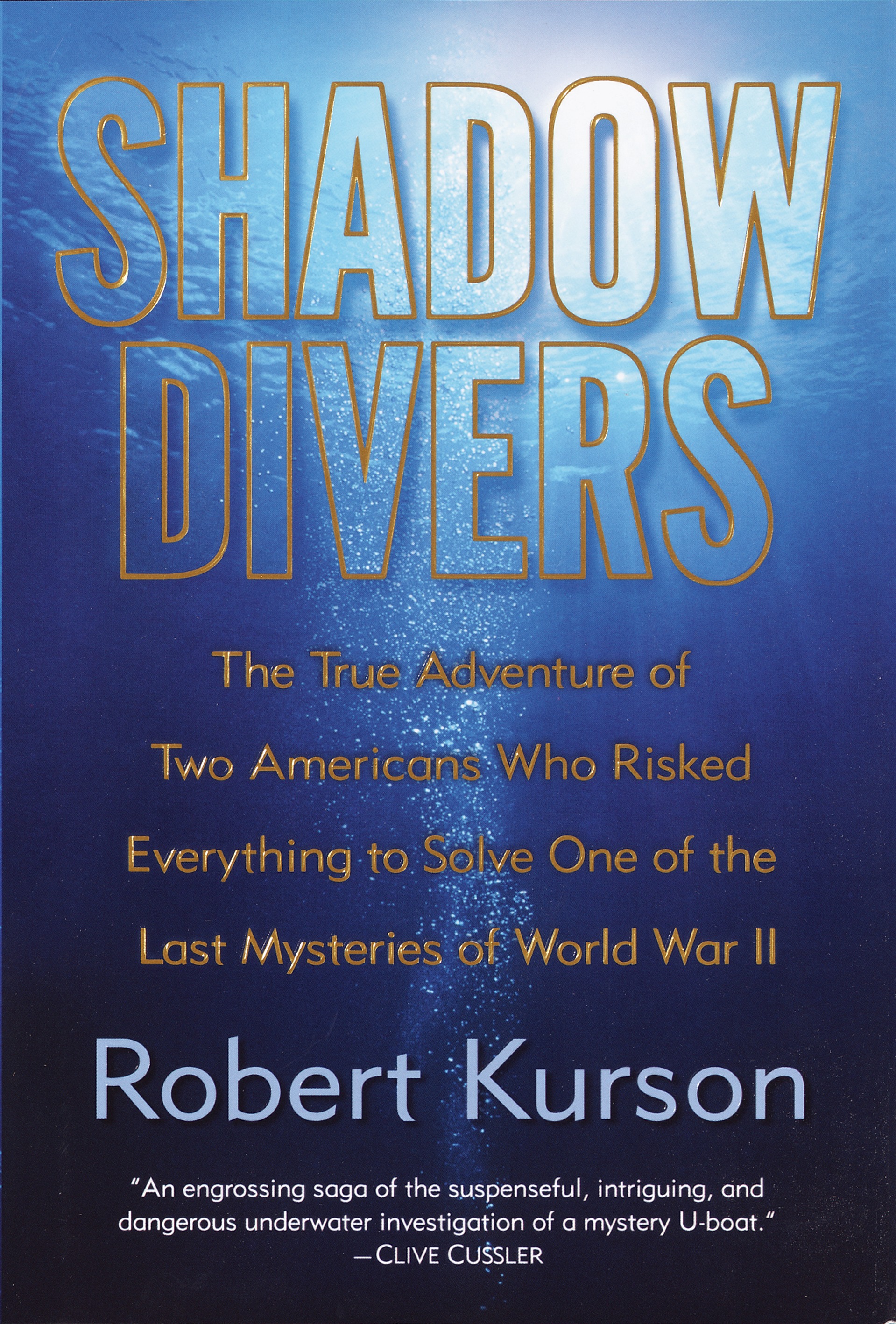News
Book Review: Shadow Divers by Robert Kurson

In the first in a new series of book reviews, Fred Lockwood reviews Shadow Divers by Robert Kurson…
 Imagine you are a scuba diver inside the devastated wreck of a WWII German U-Boat. You are 65 nautical miles off the east coast of America, in the Atlantic Ocean, at a depth of 230 feet and breathing compressed air. (This is a time before rebreathers and trimix!) It’s cold, dark and you are alone. The slightest movement, and your own bubbles, stir up sediment that has taken decades to accumulate – and will take hours to settle. In the gloom there are dangling wires and cables waiting to ensnare you, delicately balanced debris to trap you and jagged edges everywhere. Outside the hull there is a current eager to wash you into the void.
Imagine you are a scuba diver inside the devastated wreck of a WWII German U-Boat. You are 65 nautical miles off the east coast of America, in the Atlantic Ocean, at a depth of 230 feet and breathing compressed air. (This is a time before rebreathers and trimix!) It’s cold, dark and you are alone. The slightest movement, and your own bubbles, stir up sediment that has taken decades to accumulate – and will take hours to settle. In the gloom there are dangling wires and cables waiting to ensnare you, delicately balanced debris to trap you and jagged edges everywhere. Outside the hull there is a current eager to wash you into the void.
The above scenario is not fiction but fact. In Shadow Divers Robert Kurson narrates the true story of how two deep wreck divers, John Chatterton and Richie Kohler, commit and risk everything to identify the mystery wreck and explain its demise. However, Shadow Divers is more than just a diving yarn. It raises issues about the ethics of diving on war graves, how personal perspectives influence our lives and the fallibility of official historical records.
Kurson documents the strong desire amongst divers, like Chatterton and Kohler, to claim artefacts from wrecks – even putting their lives at risk in doing so. Indeed, several of the photographs in the book show divers displaying items recovered. However, despite being informed that the German government regard any U-Boat wreck to be “tombs of a seaman’s grave” (p.148), they continued searching for artefacts to identify it; the search becomes an obsession and one they seek to justify.
The chapters devoted to the main players in the story provide insights into their character, the principles by which they live their lives and how they changed over the years of exploration. For some the path leads to self-destruction, to others greater self-awareness and being able to live with their actions. These men become unofficial guardians of the wreck as they deliberately avoid searches that could disturb the remains of long dead sailors whilst at the same time trying to identify them. It is difficult to disagree with Kurson when he says exploration of the wreck evolved from “an artefact site into a moral obligation” (p. 287).
The task of identifying a wreck is typically guided by official records, testimony and the word of experts. But what if these are wrong? What if these accounts are based on sloppy and erroneous assessment? German and Allied records indicated that no submarine could be where it was discovered! Kohler’s conclusion, that “- no government or navy or professor or historian has a clue – that it’s even here” (p.185) challenged historical record. In narrating the search Kurson shares the highs and lows of their painstaking investigation and personal challenges as the project impacted their lives. It is a testimony to their tenacity that they didn’t merely accept the official government records and the views of experts.
If I have any criticism it would be a small one. It would be the space devoted to accounts of diving on the Andrea Doria – the Italian cruise liner that collided with the Stockholm and which sank with the loss of fifty-one lives. Whilst it served to reinforce the danger of deep wreck diving, and exemplified the exploration techniques used later, it detracted from the main story.
As a recreational diver I found the accounts of diving inside the submarine compelling. Kurson takes you down to the wreck and inside it. His description of the anaesthetic effect of nitrogen narcosis, running out of air, panic attacks and sheer bad luck that claimed the lives of other divers are, fortunately, outside my experience. However, the thoroughness of the research they conducted would impress any PhD examiner. Shadow Divers is an incredible story.
Robert Kurson obtained his bachelor’s degree in philosophy from the University of Wisconsin and his law degree from Harvard Law School. He has worked as a journalist and writer in the USA.
Other books written by Robert Kurson include:
- Crashing Through (2007) New York: Random House
- Pirate Hunters (2015) New York: Random House
- Rocket Men (2018) New York: Random House
They are available via Amazon and his website where he can also be contacted: www.robertkurson.com
- Shadow Divers (2004) New York: Random House by Robert Kurson
- ISBN 0 375 76098 9 (388 pages)
Find out more about Professor Fred Lockwood, who is also a published author, at www.fredlockwood.co.uk.
Gear News
Introducing the TR-80, IR-50 and CS-30 Regulators from DYNAMICNORD

Whether you are a beginner or a professional diver – with the three new main regulators from DYNAMICNORD, everyone will find their favourite regulator. They all look super stylish.
Excellent performance with the TR-80
Quality and performance are the be-all and end-all for regulators. It is not for nothing that the TR stands for Tec Reg. The innovative design of the TR-80 guarantees absolute reliability – even in ice-cold waters.

Perfect breathing effort at 0.8 J/l / certified for diving in waters below 10 degrees / structural design made of solid brass for best cold protection / membrane-compensated design with dry seal of the first stage / reduced exhalation effort thanks to optimized exhalation membrane and bubble deflector / adjustable Venturi (dive/predive) and adjustment knob for individual inhalation comfort / innovative design of the front cover prevents free-flow in strong currents or when diving with scooters / design made of sandblasted brass, matt chrome finish / 2 HP and 4 LP outlets / mouthpiece made of high-quality, anti-allergic silicone for maximum comfort.


Amazing underwater adventures with the IR-50
The IR-50 is the top regulator for advanced and experienced divers. Natural breathing is the essence of this regulator.

Ideal breathing effort at 0.8 J/l /certified for diving in waters below 10 degrees / compensated membrane / adjustable venturi (dive/predive) and adjustment knob for individual inhalation comfort/ outlet valve and deflector for minimum exhalation effort and reduction of bubbles on the face / design made of sandblasted brass, matt chrome finish / 2 HP and 4 NP outlets / mouthpiece made of high-quality, anti-allergic silicone for maximum comfort.


The Workhorse – our CS-30
For diving centres and diving beginners – the workhorse stands for strong construction, reliability and robustness. Perfect for your training.

Optimal breathing effort at 0.8 J/l /recommended for diving in waters above 10 degrees / non-compensated piston / adjustable venturi (dive/predive) / outlet valve and deflector for minimum exhalation effort and reduction of bubbles on the face / design made of sandblasted brass, matt chrome finish / 1 HP and 3 NP outlets / mouthpiece made of high-quality, anti-allergic silicone for maximum comfort.


Octopus OP-30
The OP-30 is the ideal addition to all DYNAMICNORD regulators. It is identical in construction to the CS-30.

The TR-80, IR-50, CS-30 (DIN & INT) regulators and the Octopus OP-30 are available from DYNAMICNORD dealers and in the online store.
DYNAMICNORD – Your Outdoor Companion.
Marine Life & Conservation
Paul Watson Released as Denmark Blocks Japan’s Extradition Bid

Renowned anti-whaling activist Paul Watson has been released from custody in Greenland after spending five months in detention. Denmark’s Justice Ministry rejected Japan’s request for his extradition, citing insufficient guarantees that his time already served in custody would be credited against any potential sentence.
The 74-year-old Canadian-American was arrested on July 21 in Nuuk, Greenland’s capital, when his ship docked to refuel. His arrest was based on a 2012 Japanese warrant related to a 2010 encounter in Antarctic waters. Japan alleged Watson obstructed operations and caused damage to a whaling research ship during efforts to disrupt illegal whaling. Watson has consistently denied these claims, maintaining his commitment to marine conservation.
Denmark, which oversees extradition matters for Greenland, concluded that while the legal conditions for extradition were met, the lack of assurances from Japan regarding time-served credit made extradition untenable.
In a video shared by his foundation, Watson expressed gratitude and relief, saying, “After five months, it’s good to be out… and good to know they’re not sending me to Japan.” He added that the most difficult part of his time in custody was being separated from his two young sons.
Watson is a pioneering figure in marine conservation, known for founding the Captain Paul Watson Foundation in 2022 after decades of activism with the Sea Shepherd Conservation Society. His bold efforts to defend marine life have earned him widespread support, including from celebrities and conservationists. His work has also been featured in the acclaimed reality TV series Whale Wars.
Watson’s lawyer, Jonas Christoffersen, praised the decision, stating, “We are happy and relieved that Paul Watson is now free.” He added that Watson is eager to reunite with his family and continue his vital work.
The arrest occurred while Watson’s vessel, the M/Y John Paul DeJoria, was en route to the North Pacific with a team of 26 volunteers to intercept a Japanese whaling ship. His foundation described the arrest as politically motivated and emphasized that Watson’s actions were focused on ending illegal whaling practices.
Japan resumed commercial whaling in 2019 after leaving the International Whaling Commission, asserting that whale meat is a cultural tradition. Conservationists, however, continue to challenge these practices, highlighting their impact on marine ecosystems.
Despite the challenges, Watson remains steadfast in his mission to protect marine life and bring attention to whaling practices. His dedication to ocean conservation has made him a globally respected advocate for the environment.
-

 News2 months ago
News2 months agoIconic SS United States to become the World’s Largest Artificial Reef
-

 News3 months ago
News3 months agoBook Review – 52 Assignments: Underwater Photography
-

 Gear News3 months ago
Gear News3 months agoDYNAMICNORD – New German diving brand enters the British market
-

 News3 months ago
News3 months agoExploring Cenote El Pit: A Diver’s Dream
-

 Gear News3 months ago
Gear News3 months agoTry BARE drysuits (and maybe even win one!) this Friday with Sea & Sea at North West Dive Fest
-

 Marine Life & Conservation3 months ago
Marine Life & Conservation3 months agoBook Review: Coral Triangle Cameos
-

 Blogs2 months ago
Blogs2 months agoDive the Egyptian Red Sea this Autumn with Regaldive
-

 News3 months ago
News3 months ago2024 Ocean Art Underwater Photo Competition Announced















